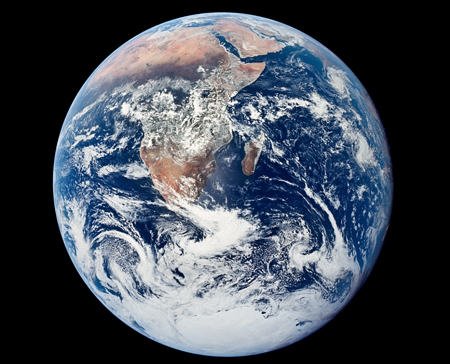The earth is silently saving the environment
For hundreds of years, the Earth has absorbed more than half of the CO2 emitted by humans and this phenomenon will continue in the future.
Forests and oceans are places to 'swallow' carbon dioxide in the atmosphere. Daily Mail said that in the past few decades, many scientists think that the Earth's ability to absorb CO2 will decrease as the area of forests shrinks and oceans become acidified. That situation leads to the accumulation of emissions in the air, causing the temperature to rise very quickly.
But in a report recently released on November 11, scientists at the University of Bristol (UK) stated that, although CO 2 emissions are increasing day by day, the earth is still capable of 'confining'. 'large amounts of greenhouse gases in oceans and forests.
According to the research team, the amount of CO2 produced by humans in 1850 was 2 billion tons. But so far CO 2 is increasing to 35 billion tons / year. Fortunately, the green planet still absorbs more than half of the man-made CO2 emissions in the last 159 years (calculated from 1850 to 2009).

Earth will continue to absorb CO2 in the future.Photo: mit.edu .
Wolfgang Knorr, the team leader, said he and his colleagues only analyzed actual data - such as Antarctic ice samples - rather than using climate models like many other studies.
'Some previous studies suggest that within the next 10 years, the amount of CO2 in the atmosphere will increase rapidly because of the ability of the Earth to absorb CO2, but we have found no evidence of that trend. , Knorr said.
The view of the Knorr group was strengthened when VU University (Netherlands) published a study that showed that the amount of CO2 produced by humans was much higher than it actually was. This study also shows that Antarctic marine flora is helping people resist the greenhouse effect by absorbing carbon in the atmosphere every time the ice melts. Scientists from the Antarctic survey program, the British Antarctic Survey (UK), confirm this. They said that plankton species are proliferating rapidly in areas exposed to ice due to melting.
However, Dr Knorr stressed that the world must still work to reduce carbon emissions by signing an agreement to cut emissions during the climate conference in Copenhagen (Denmark) next month. He pointed out that atmospheric emissions continue to increase even more than half have been absorbed by the earth. Knorr also worries that oceans and soil will become saturated with CO2 so it cannot be absorbed at some point in the future.
- How to save electricity in winter
- Clean gas stove 'Made in Vietnam' environment
- Energy saving market in Vietnam is prospering
- It was lost and lost when enjoying Earth Hour
- Do not use gas-saving tablets
- How does the energy turn off the light from Earth Hour?
- 10 ways to protect the living environment
- Energy saving solutions for universities
- 'Environment-friendly' solutions for your home
- Smart power saving device
- You may not know the true meaning of the invention of these 5 familiar widgets
- Build the first energy-efficient home in 2013
 Is the magnetic North Pole shift dangerous to humanity?
Is the magnetic North Pole shift dangerous to humanity? Washington legalizes the recycling of human bodies into fertilizer
Washington legalizes the recycling of human bodies into fertilizer Lightning stone - the mysterious guest
Lightning stone - the mysterious guest Stunned by the mysterious sunset, strange appearance
Stunned by the mysterious sunset, strange appearance